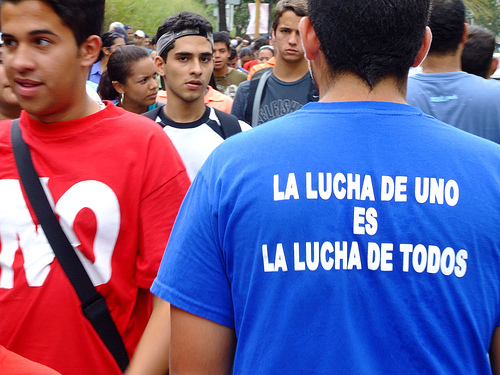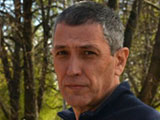If it Looks like a Duck and Quacks like a Duck, Then it’s a…
by Israel Centeno and translated by Kelly V. Harrison / August 27, 2013 / No comments
Passivity, gangsterism, and a lack of unity in Venezuelan politics.

Photo: Rodrigo Suarez in Caracas, via Flickr.
What strategy should be employed to fight against a neo-dictatorial government?
It must be difficult for someone outside Venezuela to find out what’s happening in the country. From that perspective one can only hazard a guess at what is really going on here. Although various forums have noted the loss of democracy and the authoritarian, militaristic character of Hugo Chávez’s political process—from his appearance on the scene for a few seconds following the attempted coup d’état in 1992, throughout his time in government, right up to his death and now in his “legacy”—opinions appear to converge and become confused. This is particularly the case when the official propaganda takes figures from the “Bolivarian missions” and combines them with a nationalist rhetoric, an anti-globalization and anti-neoliberal (or, rather, anti-imperialist) discourse that is easy to market to the universal left.

- From his lonely watch post Albert Camus asked who among us has not experienced exile yet still managed to preserve a spark of fire in their soul. “We’re all alone,” Natalia Sedova cried in exile on hearing of her husband Leon Trotsky’s affair with Frida Kahlo. In his novel Night Watch, Stephen Koch follows the incestuous love affair of David and Harriet, wealthy siblings watching the world from their solitary exile. Koch’s writing, Camus’s theories, and Trotsky’s affair all come back to exile and lead me to reflect on the human condition. From my own vantage point, my Night Watch, I will reflect on my questions of exile, writing, and the human condition.

- Israel Centeno was born in 1958 in Caracas, Venezuela, and currently lives in Pittsburgh as a Writer-in-Residence with City of Asylum/Pittsburgh. He writes both novels and short stories, and also works as an editor and professor of literature. He has published nine books in Venezuela and three in Spain.
When attempting to describe the government’s regime and its characteristics, the search for unity of purpose within the opposition also ends up muddled. Naming things has proved difficult. Excessive care is taken by the opposing side to show their guarantee of good behavior and Gandhian pacifism, but at the end it’s closer to apathy than political strategy. Though it’s true that the government has criminalized any form of protest, it’s not any less true that the opposition has let itself be cornered. Today we face a scenario in which unity is being revived; however, the impression is that this unity exclusively endorses an electoral strategy.
If we start from the position that there have been three currency devaluations, a daily increase in the number of deaths resulting from violence, a rigid and corrupt currency exchange control, a shortage of basic commodities, repression, the definitive positioning of media hegemony, an increase in debt, and a loss of public space since Maduro was bequeathed Chávez’s legacy, there should still be protests on the streets. This does not mean giving up on the electoral path, but the people have not been mobilized. I recall a Leninist principle that would suit the opposition to a T: Protests must first be undertaken for reasons of need and later demand to be undertaken for political motives, a method that is reversed in the Venezuelan dynamic. The political leadership has perceived reality in a purely electoral way. A different perspective would see reality interwoven with the protests and demands of all the sectors that today endure the inefficiency and unviability of corrupt authoritarianism. The street protest as a form of dispute is not necessarily insurrectionary; it is legitimate and can even trigger other strategies. People must assemble in order to achieve results that translate into political change. In Venezuela, hundreds of scattered protests are registered every day, isolated by a politically articulate leadership.
Going back to the start, the regime must be given a name. Dictatorship, or authoritarian democracy? Communism or fascism? We have to agree on one. From this humble platform, having observed the discourse of the lieutenants who have lead the Venezuelan revolution over the years, those who have blurred the lines of institutionalism and seized power I would not hesitate to call gangsters. Fascist gangsters, moreover, but not Nazis or Francoists. No, Pedro Carreño, Diosdado Cabello, and their mentor, Hugo Chávez, are all just like Benito Mussolini.




